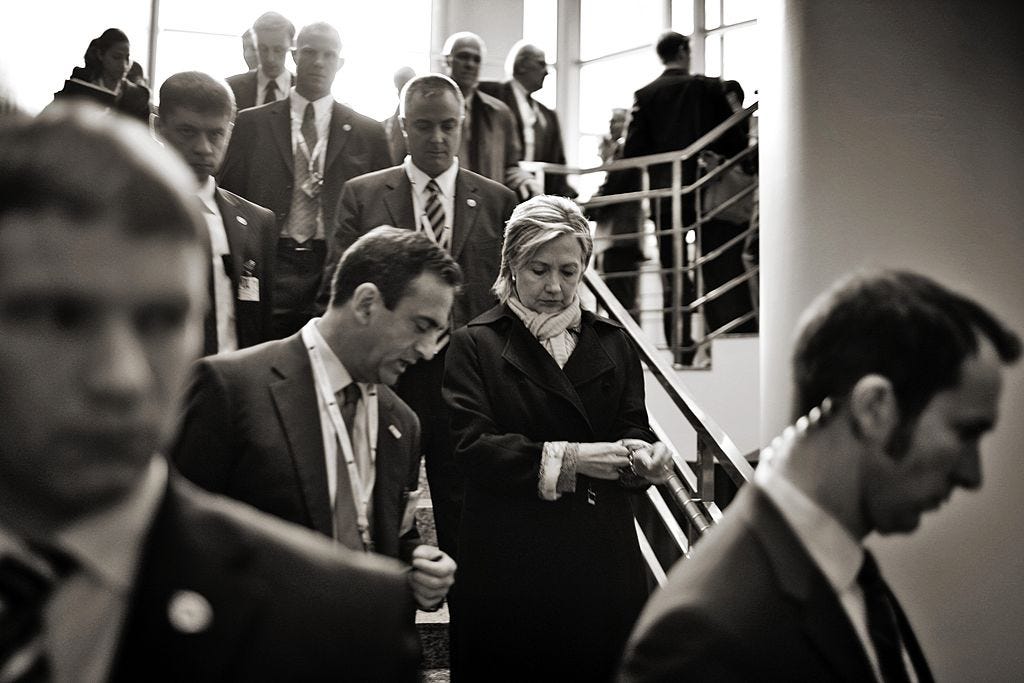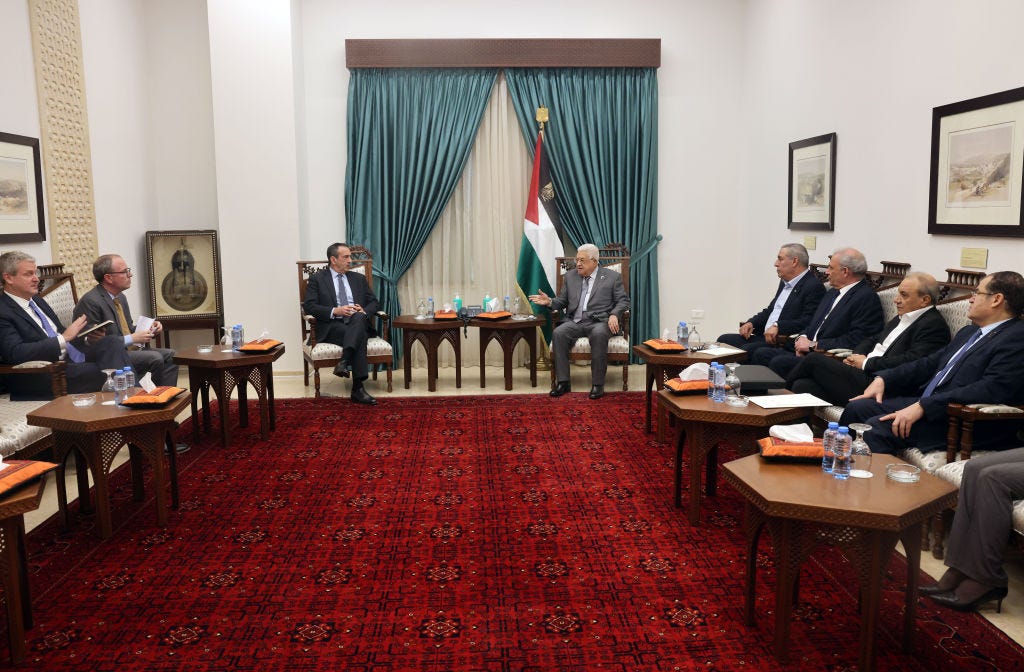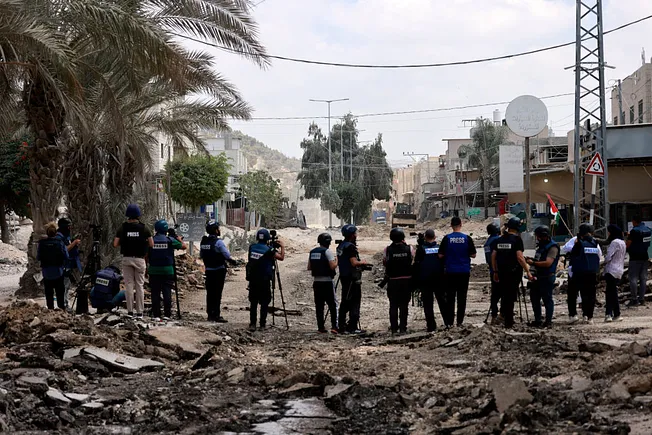What does Kamala Harris believe about the Middle East? Does she side with the old-school Democrats in her party, who are traditionally pro-Israel? Does she believe that the 2015 Iran nuclear deal, the Joint Comprehensive Plan of Action (JCPOA), was transformational—and should be salvaged? What does she think about a U.S. defense pact with Saudi Arabia? Syria’s president Bashar al-Assad? And Sudan’s widening civil war?
With the specter of a broad Mideast war hanging over this presidential election—and potential U.S. involvement growing as the Pentagon dispatches carriers, destroyers, and missile-defense capable cruisers to the region—the answers to all of these questions are far more urgent than they typically would be for American voters. The problem is that Vice President Harris has largely been a back-bencher on foreign policy, unlike some of her predecessors, including her boss Joe Biden.
Which is why a man named Philip Gordon—who has served as Harris’s foreign policy adviser since she ran for the White House in 2020 and has worked in every Democratic administration since Bill Clinton’s—has become the focus of tremendous scrutiny in Washington over the past few weeks.
Republicans believe that through Gordon they have the outlines of a Harris foreign policy agenda. And they’re already crafting their political attacks around it. “Democrats want to put him in charge of the White House’s entire foreign policy,” Republican senator Ted Cruz told The Free Press. “It would be unspeakably catastrophic.”
Gordon’s critics from the right say he’s not just wrong on issues—he’s skeptical of U.S. military power and the efficacy of financial sanctions—but that he’s also developed troubling contacts with institutions and individuals close to Iran. Republicans are already demanding Vice President Harris answer why Gordon wrote a string of 2020 opinion pieces with a Pentagon official, Ariane Tabatabai, who was tied last year to an Iranian government-backed influence operation, called the Iran Experts Initiative, tasked with selling the 2015 nuclear deal. (More in a moment.)
“Before joining your office, Mr. Gordon co-authored at least three opinion pieces with Ms. Tabatabai blatantly promoting the Iranian regime’s perspective and interests.” Republican senator Tom Cotton and Representative Elise Stefanik wrote Harris on July 31. “Each prediction was. . . wrong, as it was biased in favor of Tehran.”
Gordon and Harris’s office declined repeated requests for comment from The Free Press. Ariane Tabatabai has also declined to publicly comment on her role in the Iran Experts Initiative.
The Limits of American Power
Most Americans will never have heard Gordon’s name. But he is part of a core group of Democratic foreign policy experts who have helped guide U.S. global strategy for the past three decades.
The Johns Hopkins University PhD initially focused on Europe during the Clinton and Obama administrations when the U.S. partnered with NATO to use military force and espionage to combat ethnic cleansing in the Balkans and North Africa—ultimately unseating Libyan dictator Muammar Gadaffi. The actions at the time were seen as in line with the Democrats’ core philosophy of liberal interventionism.
But that philosophy began to shift for Gordon during Obama’s second term, when the Middle East became his bailiwick and he coordinated regional policy at the National Security Council.
His recent writings reveal the experience left him—and others in the White House—with a much greater skepticism of the U.S.’s ability to influence events on the ground, given the fallout from the wars in Iraq, Afghanistan, and Libya, and Washington’s failures to promote democratic change in Egypt and Syria. “Phil left the Obama administration with a much clearer understanding of the limits of American power and the need for a much more humble foreign policy than most of those in Biden’s inner circle,” Trita Parsi, vice president of the neo-isolationist Quincy Institute for Responsible Statecraft, recently told The Nation.

Over the past half-decade, Gordon has espoused a deep wariness of using American military and economic power to attempt to coercively affect global change—a view that could be challenged by a rising China and the major wars gripping Europe and the Middle East. In his 2020 book Losing the Long Game, the 61-year-old diplomat recounts what he argues has been a disastrous run of U.S. efforts to use military force to engineer leadership change in countries ranging from Afghanistan to Libya. In the case of Syria, where former president Obama threatened and then backed away from attacking President Assad’s military, Gordon argues that the U.S. would have been better off never calling for the Arab despot’s removal in the first place.
“It is therefore hard to avoid the conclusion that if the United States was not prepared to accept the real costs and consequences of regime change—which are always greater than its proponents acknowledge—it would have been better not to pursue the goal,” he wrote.
But it is Gordon’s view of Iran that has most alarmed Republicans and critics of a constrained American foreign policy.
No recent foreign policy issue has divided Democrats and Republicans more than the Iran nuclear deal—Obama’s signature achievement. Architects of the deal, including Gordon, argue that it is a template for a new American foreign policy. They say the agreement—had Trump not scuttled it—would have neutralized Tehran’s nuclear capacity without requiring American or Israeli military action. And they argue the easing of economic sanctions could have allowed Iranian businesses and civil society to better integrate internationally and potentially moderate Tehran’s clerics. “A nuclear agreement could begin a multigenerational process that could lead to a new relationship between our countries. Iran could begin to reduce tensions with its neighbors and return to its rightful place in the community of nations,” Gordon said in a 2014 speech, outlining President Obama’s hopes for the deal.
But critics have argued the loosening of sanctions on Iran has provided Tehran with billions of dollars to fund its terror proxies across the Mideast—proxies that unleashed the massacres of October 7 and that today threaten commercial traffic across the Persian Gulf and other strategic global waterways. Gordon was among the most vocal Democratic critics of former President Trump’s 2018 decision to pull the U.S. out of that landmark nuclear agreement.
Harris has largely been mum on the Mideast threats since taking to the campaign trail last month. There’s also no foreign policy section yet displayed on her website. But the progressive wing of her party is already pressing their candidate to immediately engage Tehran’s newly elected president, Masoud Pezeshkian, to help end the Gaza war. The Iranian leader has announced his desire to resume nuclear diplomacy with the West, a track Gordon could lead in a Harris administration.
But Americans have gotten some insights into Harris and Gordon’s position in recent weeks. After a late July rocket attack on Israel by Lebanese terror group Hezbollah that killed 12 schoolchildren, Harris drew fire for initially remaining quiet.
Then, last Thursday in Michigan, the candidate met with pro-Palestinian activists who said that that Harris had told them at a political rally she was “open” to discussing their calls for a U.S. arms embargo on Israel. Philip Gordon batted cleanup: “@VP has been clear: she will always ensure Israel is able to defend itself against Iran and Iran-backed terrorist groups,” Gordon said on X. “She does not support an arms embargo on Israel. She will continue to work to protect civilians in Gaza and to uphold international humanitarian law.”

Iran Experts Initiative
But it’s not just Gordon’s positions on Iran that are being heavily scrutinized. It’s his ties to Ariane Tabatabai and other Biden administration officials who are, or have been, probed by Congress and the U.S. government in recent months for their suspected links to Tehran’s Islamist leadership.
Alarm about Iran’s influence in Washington first gained traction last year after the State Department quietly revoked the security clearance of the Biden administration’s point man on Iran policy, special envoy Robert Malley. The diplomat had worked closely with Gordon during the Obama years to craft the 2015 nuclear deal with Tehran. And Malley had been seeking to revive Iran diplomacy when he was placed on unpaid leave in June 2023.
The White House and State Department have repeatedly refused to explain Malley’s absence or status. But Republicans investigating his case told me they uncovered evidence that the FBI is now probing whether Malley illegally downloaded classified documents onto his personal devices and may have shared them with individuals outside the U.S. government. Administration officials have privately told me they were stunned last summer when documents and information tied to Malley began appearing in Iranian state media, giving the impression that Iran had essentially penetrated the U.S. government’s communications systems. Malley has refused to comment publicly on his case beyond an initial statement saying he’d be vindicated and back in government.
Concern about Iran’s activities deepened further last fall when I published in the news site Semafor the first in a series of articles about Iranian influence operations in the West. The initial piece focused on The Iran Experts Initiative, or IEI, and detailed how Tabatabai and a group of other influential U.S.- and Europe-based Iran experts closely coordinated with Iran’s Foreign Ministry, starting in 2014, to produce opinion pieces and studies that advanced Tehran’s position on the nuclear deal and other national security issues, while never disclosing it. The story was based on a large cache of Iranian government emails that were obtained by the Persian-language television channel Iran International and shared with Semafor, where I previously worked.
Some members of the IEI publicly denied they were essentially acting under the control of Iranian diplomats, and described the program as informal. But in the emails I reviewed, Iranian officials describe closely monitoring the publications and media appearances of IEI members. And Tabatabai, in her own correspondence, can be seen seeking Tehran’s guidance on her travel plans and appearances before Congress. Other IEI members offer to ghostwrite opinion pieces for Iranian diplomats and pledge to help the Foreign Ministry advance its positions in the international nuclear talks.
Malley initially brought Tabatabai into the State Department in 2021 to join his nuclear negotiating team with Iran. Shortly before his suspension, she departed to the Pentagon to become chief of staff for Christopher Maier, assistant secretary of defense for special operations and low-intensity conflict. It’s one of the most sensitive offices in the Department of Defense, requiring high-level security clearances.
Republican lawmakers have repeatedly questioned Tabatabai’s continued presence in the Pentagon. And Cotton and Stefanik are seeking to know if Gordon knew of her participation in the IEI when he jointly drafted with her three opinion pieces during the 2020 election cycle that sharply criticized the Trump administration’s position on Iran.
In January 2020, the two argued in The New York Times that the U.S.’s assassination of Iran’s most powerful military officer, Major General Qasem Soleimani, needlessly antagonized Tehran. The Pentagon had argued that Soleimani was behind a string of attacks on U.S. military forces in the Middle East going back more than a decade. “The costs of the United States’ targeted killing. . . are mounting beyond the already significant risks of Iranian retaliation and subsequent military confrontation,” Gordon and Tabatabai wrote on January 6, 2020, just three days after Soleimani’s death.
Three months later, in March 2020, Gordon and Tabatabai pressed in The Washington Post for the U.S. to ease some economic sanctions on Tehran in order to help Iran manage the Covid-19 pandemic that they argued risked spreading the virus across the Middle Eastern country’s borders. “In the face of an impending humanitarian catastrophe in Iran and desperate appeals for an urgent international response, the Trump administration has, unsurprisingly, responded by calling for more pressure and ever more sanctions, the latest of which were imposed on March 18,” the March 2020 article reads.
Gordon’s critics note that Iran’s pandemic troubles didn’t spread cross-border. And they also point out that Iran’s Supreme Leader Ayatollah Ali Khamenei actually declined U.S. offers of Covid-19 assistance, citing a conspiracy theory that Washington actually created the disease to harm its enemies.
Cotton and Stefanik, in their letter to Harris, ask if Gordon and Tabatabai purposefully spread Iranian disinformation to relieve U.S. pressure on Tehran’s theocratic rulers. “Did you request further investigation into Mr. Gordon when Ms. Tabatabai’s connections to the Iranian Foreign Ministry were revealed in September 2023? Did Mr. Gordon admit and report his ties to this individual?” they wrote.
Harris, to this date, hasn’t replied.
Jay Solomon is an investigative reporter for The Free Press, and author of the book, The Iran Wars. He most recently worked at Semafor, where he was global security editor; before that, he was chief foreign affairs correspondent for The Wall Street Journal. Follow him on X at @jaysolomon.
To support more of our work, become a Free Press subscriber today:












our Comments
Use common sense here: disagree, debate, but don't be a .